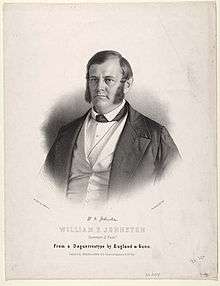William F. Johnston
William Freame Johnston (November 29, 1808 – October 25, 1872) was the 11th Governor of Pennsylvania from 1848 to 1852. A lawyer by training, Johnston became district attorney of Westmoreland County at the age of 21 in 1829. He was elected to the Pennsylvania state legislature and switched from the Democratic Party to the Whig Party in 1847 to run for the Pennsylvania Senate.
William F. Johnston | |
|---|---|
 | |
| 11th Governor of Pennsylvania | |
| In office July 9, 1848 – January 20, 1852 | |
| Preceded by | Francis R. Shunk |
| Succeeded by | William Bigler |
| Personal details | |
| Born | William Freame Johnston November 29, 1808 Greensburg, Pennsylvania |
| Died | October 25, 1872 (aged 63) Pittsburgh, Pennsylvania |
| Political party | Whig |
| Other political affiliations | Democratic Party, Know Nothings |
| Spouse(s) | Mary Montieth (m. 1832–1872; his death) |
William F. Johnston was born on November 29, 1808 in Greensburg, Pennsylvania. His parents were Alexander Johnston, an Ulster Scots immigrant from County Tyrone and Elizabeth (Freame) Johnston, whose father was born in Belfast.[1] In 1832, Johnston married Mary Ann Montieth (1814–1898). The couple had five sons and two daughters.
He was named Senate Speaker in 1848 and, upon the resignation of Governor Francis Shunk, assumed the position of governor. Although, because of the transition, Johnston could have delayed the scheduled October elections, he chose to let them proceed and was narrowly elected to the position, defeating Democratic candidate Morris Longstreth by only 297 votes. Although he was part of the Free Soil faction of Whigs opposed to slavery, Johnston faced the federal Fugitive Slave Act and fought its enforcement in Pennsylvania. Johnston lost re-election to Democrat William Bigler in 1851.
In 1856 he was nominated by the northern, anti-slavery faction of the American Party for the office of Vice President, but was later induced to withdraw in favor of William L. Dayton, the Republican nominee.[2]
Johnston Commons on Penn State University is named for the former governor. His father built and operated the Kingston House in Unity Township, Pennsylvania.[3] It was added to the National Register of Historic Places in 1983.[4]
References
- "William Freame Johnston" (PDF). Rootsweb.ancestry.com. Retrieved September 19, 2015.
- Holt, Michael F. (1999). The Rise and Fall of the American Whig Party. Oxford University Press. p. 1175. ISBN 0-19-505544-6.
- "National Historic Landmarks & National Register of Historic Places in Pennsylvania" (Searchable database). CRGIS: Cultural Resources Geographic Information System. Note: This includes George Swetnam and Helene Smith (May 1982). "National Register of Historic Places Inventory Nomination Form: Kingston House" (PDF). Retrieved 2012-06-10.
- "National Register Information System". National Register of Historic Places. National Park Service. July 9, 2010.
External links
| Party political offices | ||
|---|---|---|
| Preceded by James Irvin |
Whig nominee for Governor of Pennsylvania 1848, 1851 |
Succeeded by James Pollock |
| Political offices | ||
| Preceded by Francis R. Shunk |
Governor of Pennsylvania 1848–1852 |
Succeeded by William Bigler |
